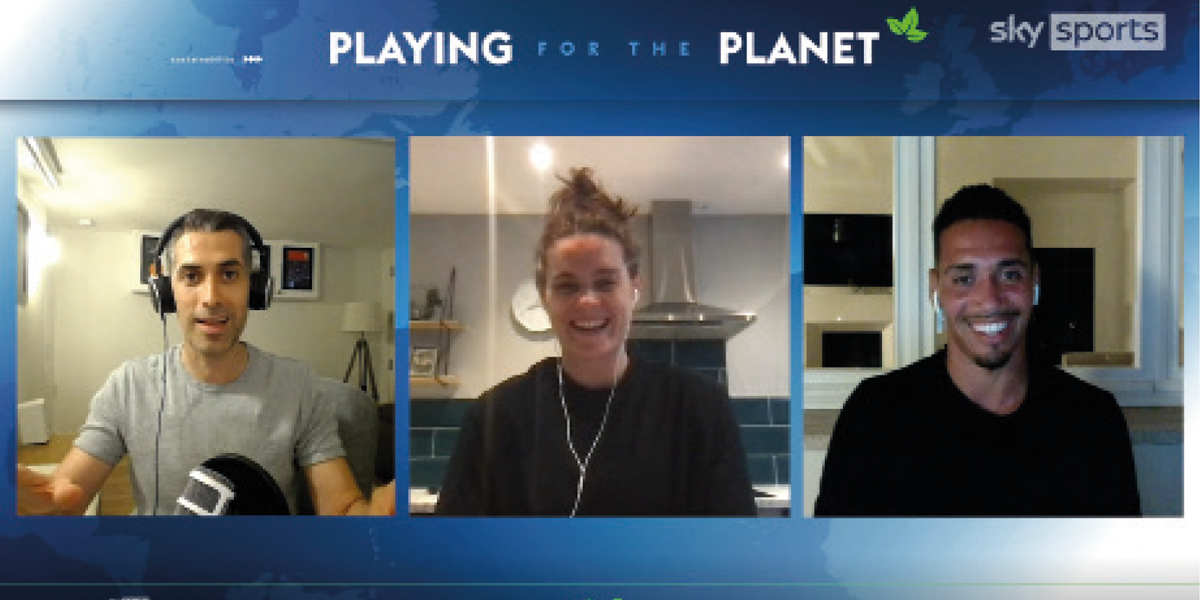To score climate goals, we need everyone

Posted on Jul 30, 2022 by FEED Staff
David Garrido has used his work at Sky Sports to sound the alarm on the climate emergency – and prepare fans for the big game ahead
Words by Neal Romanek
Let’s talk about gooooooals!
The Paris Agreement is a legally binding international treaty on climate change, adopted by 191 parties at COP 21 in Paris, on 12 December 2015 – and it entered into force on 4 November 2016. The agreement’s stated goal is to limit global warming to well below 2° Celsius, preferably to 1.5° Celsius, compared to pre-industrial levels.
As a presenter at Sky Sports, David Garrido has watched and analysed a lot of goal attempts. He is turning his gifts for communication, analysis and enthusiasm to encouraging sports fans to join the team in tackling the environmental crisis. This summer, Garrido produced and hosted a podcast called Playing For The Planet, part of The Sky Sports Football Podcast. The limited series featured talks with footballers and teams embracing a mission of sustainability and climate action. Guests included Leeds United’s Patrick Bamford, Arsenal’s Jen Beattie, AS Roma’s Chris Smalling, PSG’s Arianna Criscione, and Dale Vince, chairman of Forest Green Rovers, indisputably the greenest football club in the world.
“My family were always early adopters,” remembers Garrido. “At home, not only did we recycle lots, but we had one of those can crushers attached to the wall, where you could crumple aluminium cans, to take up less space. We weren’t allowed to put the can straight in the recycling, we had to crush it first! In recent years, my parents and sister got electric cars.
“I was very driven by the notion of purpose in my career. It was something nagging away at me that I had to address. Everything started crystallising over lockdown, and I realised I needed to be part of the conversation.”
Garrido then participated in the climate change training being rolled out across Sky departments, which brought home the extent of the environmental catastrophe. “It made me realise not just the scale of the crisis, but the opportunity that sport had to do something about it.”
Sky Sports is part of the UN Sports for Climate Action Framework. Signatories commit to:
- Undertake systematic efforts to promote greater environmental responsibility
- Reduce overall climate impact
- Educate for climate action
- Promote sustainable and responsible consumption
- Advocate for climate action through communication
The broadcaster has attempted to make sustainability in general, and climate action in particular, a regular part of its coverage. Prior to Playing for the Planet, Garrido had worked on a string of projects with Sky, starting with the Most Sustainable Transfer Deadline Day Ever at the beginning of 2021, covering one of professional football’s big news events. The broadcast received a three-star certification from the industry’s sustainability watchdog, Albert, with the crew dressed in organic and pre-owned clothing, including vegan shoes.
Later in the year, there was Sky Sports News Summer Of Sustainability, which was launched with a Climate Action Takeover Day. The coverage featured a story every hour of an athlete or club.
“I created that and – quite literally – drove it. I did five of those stories at three-hour intervals, driving between them in an electric vehicle. It was a lot of fun and I think it had that impact, with a range of sports and angles.”
David Garrido has used his work at Sky Sports to sound the alarm on the climate emergency – and prepare fans for the big game ahead
Words by Neal Romanek
Let’s talk about gooooooals!
The Paris Agreement is a legally binding international treaty on climate change, adopted by 191 parties at COP 21 in Paris, on 12 December 2015 – and it entered into force on 4 November 2016. The agreement’s stated goal is to limit global warming to well below 2° Celsius, preferably to 1.5° Celsius, compared to pre-industrial levels.
As a presenter at Sky Sports, David Garrido has watched and analysed a lot of goal attempts. He is turning his gifts for communication, analysis and enthusiasm to encouraging sports fans to join the team in tackling the environmental crisis. This summer, Garrido produced and hosted a podcast called Playing For The Planet, part of The Sky Sports Football Podcast. The limited series featured talks with footballers and teams embracing a mission of sustainability and climate action. Guests included Leeds United’s Patrick Bamford, Arsenal’s Jen Beattie, AS Roma’s Chris Smalling, PSG’s Arianna Criscione, and Dale Vince, chairman of Forest Green Rovers, indisputably the greenest football club in the world.
“My family were always early adopters,” remembers Garrido. “At home, not only did we recycle lots, but we had one of those can crushers attached to the wall, where you could crumple aluminium cans, to take up less space. We weren’t allowed to put the can straight in the recycling, we had to crush it first! In recent years, my parents and sister got electric cars.
“I was very driven by the notion of purpose in my career. It was something nagging away at me that I had to address. Everything started crystallising over lockdown, and I realised I needed to be part of the conversation.”
Garrido then participated in the climate change training being rolled out across Sky departments, which brought home the extent of the environmental catastrophe. “It made me realise not just the scale of the crisis, but the opportunity that sport had to do something about it.”
Sky Sports is part of the UN Sports for Climate Action Framework. Signatories commit to:
- Undertake systematic efforts to promote greater environmental responsibility
- Reduce overall climate impact
- Educate for climate action
- Promote sustainable and responsible consumption
- Advocate for climate action through communication
The broadcaster has attempted to make sustainability in general, and climate action in particular, a regular part of its coverage. Prior to Playing for the Planet, Garrido had worked on a string of projects with Sky, starting with the Most Sustainable Transfer Deadline Day Ever at the beginning of 2021, covering one of professional football’s big news events. The broadcast received a three-star certification from the industry’s sustainability watchdog, Albert, with the crew dressed in organic and pre-owned clothing, including vegan shoes.
Later in the year, there was Sky Sports News Summer Of Sustainability, which was launched with a Climate Action Takeover Day. The coverage featured a story every hour of an athlete or club.
“I created that and – quite literally – drove it. I did five of those stories at three-hour intervals, driving between them in an electric vehicle. It was a lot of fun and I think it had that impact, with a range of sports and angles.”


Getting out the message
Athletes are in an important position when it comes to influencing culture. Getting them to participate in the transformations that our current scientific understanding requires can change public perceptions and willingness to take action.
“Sport has this power, first of all because there are so many people who engage with it. Football is followed by 3.5 billion people. But it’s also the nature of the relationship with its audience – fans idolise these athletes. The sports, the clubs and the individuals have huge power. Anything they stand for, they’re likely to bring fans with them.”
Garrido notes that he’s had to beat the bushes a little to find good spokespeople, but he anticipates growing involvement.
“You have to do a bit of searching around. It’s not like you’ve got loads of athletes and clubs putting their hands up and saying, ‘We’ve got a story to tell you’, but there are a few. And I find that one interview then leads you to another.”
As a communicator, Garrido sees his mission as one of relaying the facts, in a way that people can understand and make use of them.
“You have to find easy ways of explaining – not to oversimplify the whole argument, but to make it palatable and engaging. But one thing
I’ve noticed during the pandemic is that people have had to engage with science more, to understand viruses and vaccines, and science’s stock value is high because the vaccine has been a way out of this. People are ready to engage with science and, ultimately, it’s a science argument we’re talking about with the climate emergency.”
Sports fans are avid students of stats, trends and year-on-year changes. There couldn’t be a more ideal group to get on board with the numbers-intensive journey to zero carbon. Engaging with the data and targets around the environment could be a great way to energise people globally.
Gamification is already being explored for climate awareness. Sky are sponsors of the organisation Planet Super League. UK football fans can register on the site and perform a variety of planet-protecting activities on behalf of their team, which are tallied in a competition called CUP26 (in the lead up to COP26). On 5 October, a sponsored day of climate action invited everyone across the UK to eat one plant-based meal, take a journey by bike or on foot, and message world leaders to take action on the climate crisis.
Professional sailing competition SailGP also run their Impact League where, alongside the regular calendar, teams have to compete in sustainability tasks.
“Another thing that sport has is the desire for competing. We like beating the opposition, we like representing our teams. I think gamification is another way in which sport can really take us to the next level.
“This problem is not going away. There is an urgency to it. And if more sporting entities can get on that journey, then it normalises the conversation, and people start changing mindsets and behaviours.”
This article first featured in the Winter 2021 issue of FEED.
Sustainability archives
Getting out the message
Athletes are in an important position when it comes to influencing culture. Getting them to participate in the transformations that our current scientific understanding requires can change public perceptions and willingness to take action.
“Sport has this power, first of all because there are so many people who engage with it. Football is followed by 3.5 billion people. But it’s also the nature of the relationship with its audience – fans idolise these athletes. The sports, the clubs and the individuals have huge power. Anything they stand for, they’re likely to bring fans with them.”
Garrido notes that he’s had to beat the bushes a little to find good spokespeople, but he anticipates growing involvement.
“You have to do a bit of searching around. It’s not like you’ve got loads of athletes and clubs putting their hands up and saying, ‘We’ve got a story to tell you’, but there are a few. And I find that one interview then leads you to another.”
As a communicator, Garrido sees his mission as one of relaying the facts, in a way that people can understand and make use of them.
“You have to find easy ways of explaining – not to oversimplify the whole argument, but to make it palatable and engaging. But one thing
I’ve noticed during the pandemic is that people have had to engage with science more, to understand viruses and vaccines, and science’s stock value is high because the vaccine has been a way out of this. People are ready to engage with science and, ultimately, it’s a science argument we’re talking about with the climate emergency.”
Sports fans are avid students of stats, trends and year-on-year changes. There couldn’t be a more ideal group to get on board with the numbers-intensive journey to zero carbon. Engaging with the data and targets around the environment could be a great way to energise people globally.
Gamification is already being explored for climate awareness. Sky are sponsors of the organisation Planet Super League. UK football fans can register on the site and perform a variety of planet-protecting activities on behalf of their team, which are tallied in a competition called CUP26 (in the lead up to COP26). On 5 October, a sponsored day of climate action invited everyone across the UK to eat one plant-based meal, take a journey by bike or on foot, and message world leaders to take action on the climate crisis.
Professional sailing competition SailGP also run their Impact League where, alongside the regular calendar, teams have to compete in sustainability tasks.
“Another thing that sport has is the desire for competing. We like beating the opposition, we like representing our teams. I think gamification is another way in which sport can really take us to the next level.
“This problem is not going away. There is an urgency to it. And if more sporting entities can get on that journey, then it normalises the conversation, and people start changing mindsets and behaviours.”
This article first featured in the Winter 2021 issue of FEED.
Sustainability archives



